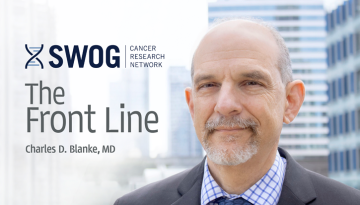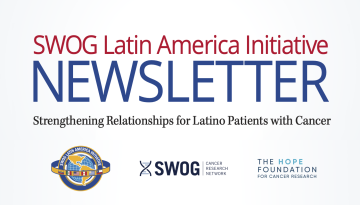Dr. Lajos Pusztai Named Breast Chair
Our breast committee is one of our most successful, and I am pleased to announce that we have a great new leader to continue its stellar run to date. Dr. Lajos Pusztai, a professor of medicine at Yale University School of Medicine, accepted the position of chair late last week.
I couldn’t be happier. Dr. Pusztai has the academic and scientific credentials, the progressive vision for the committee and its young investigators, and the strong leadership ability the position demands. He begins work immediately.
Dr. Pusztai has a European education, earning his medical degree from Semmelweis University of Medicine in Hungary, then his doctoral degree in pathology and cell biology from the University of Oxford in England. He did his fellowship at SWOG’s birthplace – MD Anderson Cancer Center – and stayed in Texas for 16 years, serving as both a practicing oncologist at MD Anderson and a professor at the University of Texas. In 2012, he went to Yale, and is now chief of breast oncology at Yale Cancer Center and co-director of its Genetics, Genomics and Epigenetics Program, where members study all aspects of gene alterations in cancer.
Dr. Pusztai’s own research group helped establish that estrogen receptor positive and negative breast cancers have fundamentally different molecular, clinical, and epidemiological characteristics and also pioneered the study of gene expression profiling as a method to predict chemotherapy and endocrine therapy sensitivity. A variety of public and private groups have funded his research, including the National Cancer Institute, ASCO, SWOG and The Hope Foundation, the U.S. Department of Defense, Susan G. Komen, the Breast Cancer Research Foundation, Merck, AstraZeneca, and Genentech. He’s published more than 250 scientific manuscripts.
Dr. Puztai’s vision for the breast committee is exciting. He has three areas of focus that he laid out to the search committee. He wants to focus on need, selecting disease areas where little progress has been made, such as metastatic triple negative breast cancer. Immunotherapies, he believes, could be a successful treatment for this and other kinds of breast cancer. Second, he wants to focus on value, launching studies that examine multiple effective treatments to determine which is the most cost-effective. Finally, he wants to increase the number of prospectively designed, translational research studies that test the clinical value of proposed new biomarkers, in the tradition of S500 and S1416. A member of the breast translational medicine subcommittee, his bent toward TM is clear, and he wants to take advantage of SWOG’s SPORE sites and our partnerships with The Jackson Laboratory and Cold Spring Harbor Laboratory.
Those who’ve worked closely with Dr. Pusztai praise his leadership style as strong, focused, and dignified. He chooses his direction, follows it, and brings others along with him. Filling the shoes of former breast chair Dr. Gabriel Hortobagyi is a tough act, but I am certain Dr. Pusztai will add to work Gabriel did. Please join me in welcoming Dr. Pusztai to his new role, and in thanking Dr. David Gandara, my senior advisor on leadership matters, for the heading the search team.
Other Recent Stories



